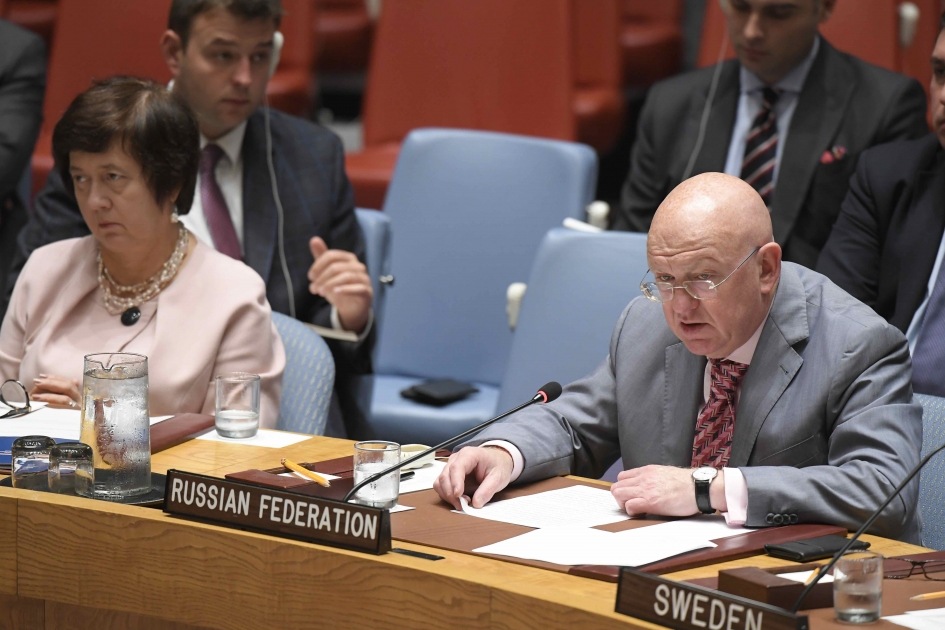Statement by Ambassador Vassily A. Nebenzia, Permanent Representative of the Russian Federation to the United Nations, at the Security Council meeting on the situation in the Middle East, including the Palestinian question
We thank Special representative Mladenov for his substantive briefing on the Middle East settlement.
Today’s meeting is taking place on a landmark day for the history of the peace process in the Middle East. Forty years ago, the Camp David Agreements were arrived at. Twenty-five years ago, the Oslo Accords were struck. Those components, alongside other parameters agreed upon by the international community, have comprised the bedrock of a political process that was also enriched by important Security Council resolutions, the Madrid guiding principles, the Arab Peace Initiative, and the road map of the Middle East Quartet of international mediators on the Middle East settlement.
At the heart of this international legal basis is the two-State solution for the Palestinian-Israeli conflict, the implementation of which is contingent upon the need for agreement to be reached on all final-status issues, including Jerusalem, refugees, borders and security, through direct dialogue between Israelis and the Palestinian people.
Unfortunately, those landmark dates arrived amid troubling developments in Middle-East policy. Indicators are increasingly pointing to an aspiration to undermine what has been developed, including with the participation of the United States, namely, the platform for a settlement. How else can one regard and view the recent decision taken by Washington to close the Palestine Liberation Organization office in the United States capital?
We genuinely fail to understand the withdrawal of financing for the United Nations Relief and Works Agency for Palestine Refugees in the Near East (UNRWA) and the recent refusal to continue to facilitate the operation of two hospitals in East Jerusalem. Bilateral commitments have collapsed. Even important security-related cooperation is under threat. Such measures do major damage to collective efforts to arrive at a comprehensive Palestinian-Israeli settlement in the Middle East. There is still time to rescind the decisions taken.
We see the response in the revision of the current approaches, which have grave consequences for the prospects of the peace process, and a return to the roots of settlement. There needs to be an emphasis on rekindling international cooperation in the spirit of Russian-United States co-sponsorship, as well as of the Madrid process. That of course led to the establishment of the Middle East Quartet, which, as we see it, is the most effective mechanism and which was approved by the Security Council. It is necessary to revitalize work to launch direct Palestinian-Israeli dialogue.
In that connection, what remains relevant is our initiative to organize in Moscow a personal meeting between the Palestinian and Israeli leaders. It is necessary to reverse existing trends, which are a consequence of unilateral decisions. I am referring to the cessation of settlement activities by Israel in the occupied territory, inflammatory rhetoric and violence on the part of both sides. Of course, one cannot overlook humanitarian assistance to the Palestinian people, above all in the Gaza strip. At the same time, we proceed from the premise that robust assistance to Gaza needs to dovetail with rebuilding unity among the Palestinian ranks.
We would note the important work carried out by the United Nations, specifically UNRWA, in the occupied Palestinian territories and in refugee camps. We welcome and support the inclusion of regional players in Middle East settlement. We note, and highly value, the role of Egypt and Jordan in Palestinian affairs. Russia’s position on a Middle East settlement was and remains principled and consistent. We firmly believe that a fair solution to the Palestinian issue is of key significance to remedy the situation throughout the region.
A pursuit of the conflict between Israel and Palestine, on the contrary, will constantly poison the overall international atmosphere, will have a detrimental effect on efforts to resolve other regional crises and will fuel terrorism. We would particularly draw attention to the importance of improving relations within the Arab family.
We are interested in a united and potent League of Arab States where all disputes are resolved on the basis of mutually respectful dialogue. We advocate the revival of multilateral efforts on Middle-East issues as a whole. We propose that colleagues thoroughly consider our vision to establish confidence-building measures in the Persian Gulf, which eventually should lead to the establishment of a pan-regional security architecture. That is important not only to resolve the crises in Syria, Yemen and Libya but also to prevent potential conflicts.
